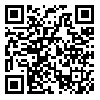BibTeX | RIS | EndNote | Medlars | ProCite | Reference Manager | RefWorks
Send citation to:
URL: http://jrh.mazums.ac.ir/article-1-1205-en.html
Background and Purpose: Stigma is one of the most prevalent social pressures associated with autism spectrum disorders, and empowering the families of autistic individuals to cope with this dual psychological burden is essential. The present study aimed to develop and validate a protocol for empowering mothers of autistic children to confront perceived stigma, using an Islamic-positive psychology approach.
Materials and Methods: A conventional qualitative text analysis approach was employed in this study, which consisted of two stages: protocol development and validation. During the initial phase, scholarly articles were retrieved from reputable national and international databases. The sampling focused on key terms and thematic content related to family education, cognitive-emotional and social training for families of individuals with disabilities, empowerment strategies against stigma, and interventions rooted in Islamic and positive psychology. The gathered texts were systematically coded using the content analysis method.
Results: The main themes obtained included acceptance of autism, increasing awareness and knowledge about autism and stigma, increasing self-esteem, hope and optimism, trust and satisfaction, patience and resilience, forgiveness, gratitude and thanksgiving, joy and happiness, outstanding capabilities and positive points, self-compassion and self-care, which were used in the development of the protocol in the form of eight training sessions. The developed protocol was validated in a sample of 12 experts using the Lawshe's method.
Conclusion: Each of the training sessions and the average of these sessions had a content validity ratio (CVR) and content validity index (CVI) higher than the minimum acceptable value for data validation, which was higher than 0.56 and 0.79, respectively.
| Rights and permissions | |
 |
This work is licensed under a Creative Commons Attribution-NonCommercial 4.0 International License. |






